Faculty Members Share Their Inspirations During Black History Month
From poets to performers, from family to students, Saint Leo University’s instructors draw on rich history to bring courage and life to classrooms.

From poets to performers, from family to students, Saint Leo University’s instructors draw on rich history to bring courage and life to classrooms.

Inspiration can come in many ways and from many people. We are inspired by art and music, performers and politicians, thinkers and doers, and family and friends. February is Black History Month, celebrating the achievements and successes of Black people around the world. Here, Saint Leo University faculty members discuss who inspires them during Black History Month and beyond.
Be Someone’s Rainbow
It's fitting that Pamela DeCius, associate chair of English, Music, and the Arts, points to Maya Angelou as her inspiration. The multi-hyphenate Angelou embraced the arts by being an author, memoirist, poet, singer, dancer, actress, and composer, as well as a civil rights activist. DeCius is inspired by Angelou’s ability to “speak to the humanity in all of us,” she said.
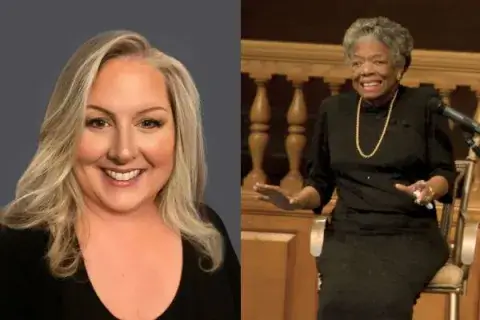
“Her work is artfully crafted — her words harness the power to connect through shared experience,” DeCius said. “She speaks to the human experience so expertly: ‘You may shoot me with your words, you may cut me with your eyes, you may kill me with your hatefulness, but still, like air, I'll rise!’"
DeCius was able to see Angelou in person while she was in graduate school. Angelou spoke about “being the rainbow in someone else's cloud” and how she always brought those who helped her in her life with her when she approached a lectern to speak or as she wrote. “I think about this every time I get ready for a class. How can I be that rainbow and who do I bring with me to help me do that work — the work beyond the lectures. How do I let the people I work with and my students know that they are seen — that they are valued and supported?”
Consider Opposing Viewpoints
The late Secretary of State and Chairman of the Joint Chiefs of Staff Colin Powell is a Black political figure who inspires Dr. Austin Trantham in his profession as a political scientist and educator.
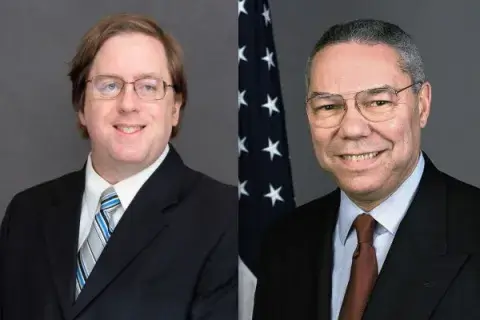
“I was fortunate to hear Secretary Powell speak from the U.S. House of Representatives chamber while serving as a congressional intern on Capitol Hill,” said Trantham, assistant professor of political science. “While critical of foreign policy decisions during the George W. Bush administration, the conviction and steadfastness of his beliefs was evident in his remarks and made a lasting impression on me.”
Trantham said while serving as secretary of state, Powell demonstrated the power of constructive dissent by providing rational counterarguments to prevailing wisdom as part of decision-making processes. “The ability to respectfully consider opposing viewpoints is missing in politics today, and so, Powell’s example continually reminds me to treat others' opinions with respect and dignity,” he added.
Empower the Next Generation
Dr. Renee Sedlack is inspired every day by one of her former students to “continue to work hard to raise the next generation of school leaders.”
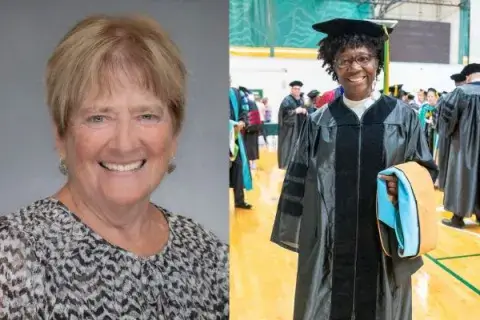
“Dr. Latoya Jordan was my student when I was the principal at Lacoochee Elementary School many years ago,” said the associate professor of educational leadership in Saint Leo’s Graduate Studies in Education Program. Lacoochee is an impoverished, isolated community in the northeast corner of Pasco County, FL.
Jordon not only earned a master's degree in education from Saint Leo, but she also earned a Doctor of Education (EdD) degree in 2024. Now, she is the principal of the school where she was Sedlack’s student. “Under her leadership, she strives to instill the belief that hard work, perseverance and determination will enable the children who attend Lacoochee Elementary to realize their dreams,” Sedlack said.
“We have been connected more than 40 years, and Latoya is an example for me of the power and possibilities that education can offer,” she added.
Connect With Family History
For two Saint Leo faculty members, family is a huge part of this Black History Month, and they look to their family members as well as civil rights leaders for inspiration.
Dr. Okey Igbonagwam, associate professor of computer science, said that while the PBS show Finding Your Roots with Dr. Henry Louis Gates Jr. helps many celebrities explore their origins, he, his wife, and four African American friends recently engaged in their own journey of discovery of their Black history. During Christmastime in 2024, the group visited Owerri, Imo state of Nigeria.
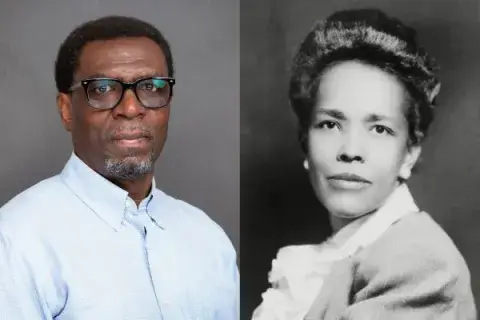
“This trip would not have taken place without the hard work of the unsung heroes of the Civil Rights Movement; it is one of the underpinning cravings for many African Americans to discover themselves,” he said. “It is important to recognize the often-overlooked contributions of women in the Civil Rights Movement. While names like Martin Luther King Jr. and Malcolm X are rightfully celebrated, many women worked tirelessly in the background, organizing, strategizing, and leading. Ella Baker is often referred to as the ‘mother of the Civil Rights Movement.’ A lifelong activist, she co-founded the Southern Christian Leadership Conference (SCLC) but later shifted her focus to empowering younger activists, helping to form the Student Nonviolent Coordinating Committee (SNCC), organizing sit-ins, freedom rides, and voter registration drives. Her philosophy of ‘participatory democracy’ emphasized the power of ordinary people to create extraordinary change.”
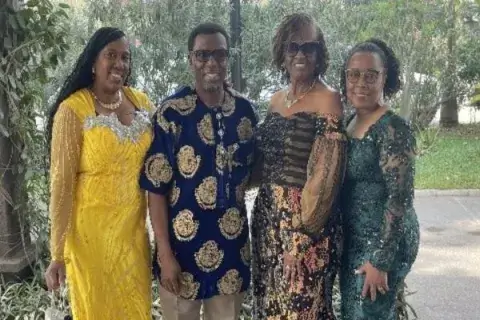
Igbonagwam also found inspiration in his own family history along with Sandy Igbonagwam of Louisiana, Valerie Jackson of Virginia, and Maxine Alkens of Georgia, when a DNA test revealed their strong Igbo lineage. The Igbo people, native to southeastern Nigeria, are known for their rich cultural traditions, entrepreneurial spirit, and resilience, Igbonagwam noted. “Their influence on African American culture is profound, from spiritual practices to cuisine, music, and community values. The transatlantic slave trade brought many Igbo people to the Americas, where they left indelible marks despite the systemic erasure of their identities.”
The education and career of Dr. Janis Prince, sociology professor and chair of the Social Sciences Department, were “inspired by three Princes!” Her mother Eula Prince, her father, Ralph Prince, and her aunt, Althea Prince are who she cites as inspirational. “Aunt Althea inspires my home and spiritual life as well,” she added. “I’m a version of them. I am walking in their footsteps.”
Although her father died long ago, his “immense intellect continues to inspire me,” Janis Prince said. “He is still the brightest person I have ever met. I have always been awed by his writing and the impact that it has had on generations of Caribbean students who even now tell me they loved reading his famous short story ‘Sharlo’s Strange Bargain.’”
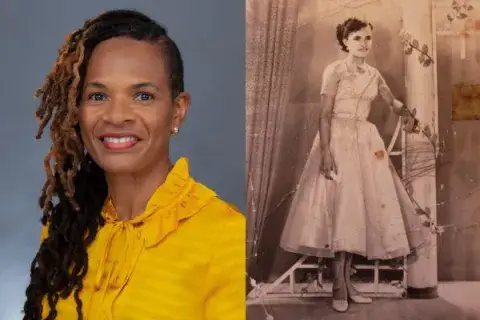
Prince’s inspiration as teacher is her mother, Eula. “As with my father, seeing her students’ appreciation for my mother’s role in their lives decades ago is a high bar!” Prince said. “And the fact that her teaching was based on years of study — as opposed to the way most PhDs spend almost no time learning how to teach — is instructive.”
Her aunt, Dr. Althea Prince, introduced her to sociology. “At the time, I had no idea what the word meant, but even as a child, I was struck by Aunt Althea’s way of seeing the world,” Janis Prince said.
Break Down Barriers
As a feminist historian, Dr. Marissa Rhodes said she is deeply inspired by how performer Josephine Baker “navigated the complex intersections of race, gender, and power in the early 20th century.”
The assistant history professor said Baker captivated her while she was studying women’s history in graduate school. “Here was this phenomenal Black woman who refused to make herself small in a world that constantly tried to constrain Black women's bodies, voices, and ambitions.”
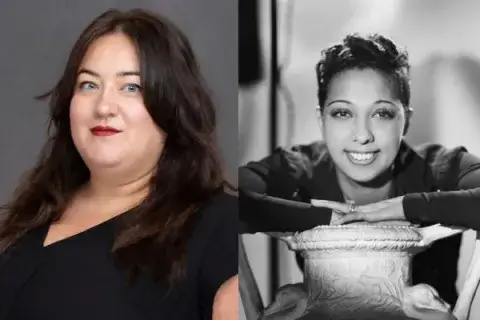
Baker rose from poverty in St. Louis to become one of the world's most famous performers, first in vaudeville shows. Her breakthrough came in 1925 when she traveled to Paris with La Revue Nègre, where her provocative dancing and comedic performances led to her becoming the highest-paid entertainer in Europe.
“What really strikes me about Baker is how she took control of her own narrative and refused to be limited by others' expectations,” Rhodes said. “She understood that she was being exoticized and fetishized by European audiences, but she cleverly turned that gaze back on itself, using it to build her own empire. She took the racist tropes that were meant to diminish her and transformed them into tools of her own empowerment. That's incredibly powerful.”
Inspiring Saint Leo’s Students
Saint Leo faculty members use the inspiration they found to in turn encourage and motivate their students.
Like Angelou, DeCius wants her students to help others. “I let them know they also have the power to be a rainbow in someone else's cloud. I want them to know that they are important and the things they do can have an impact on the world around them — even the smallest things. Teaching humanities lends itself to exploring the vast ways that humans communicate ideas about their social, political, historical and personal ideas. I hope to instill a love of learning and openness in relation to exploring new ideas, cultures and ways of being.”
Quoting Angelou, she said, “‛Do the best you can until you know better. Then when you know better, do better.’"
Trantham said that in his political science classes, “I strive to present both sides of partisan arguments while allowing my students to take part in civil debates with their peers. Providing opportunities to consider political issues from multiple perspectives allows students to become civically minded individuals, and the ability to engage in rational, informed discourse will serve them well for years to come.”
Making a difference is important to Sedlack. “I strive to teach others like Latoya who can return to their communities and live the core values that we model at Saint Leo.”
Prince tries to inspire her students “with kindness and by showing them that they have the ability to know, to learn, and to grasp complex ideas.”
Rhodes shows her students figures in history like Baker who defied easy categorization, she said. “I want them to see that history isn't just about great men making great decisions — it's about complex people making complicated choices in difficult circumstances. Baker wasn't perfect, and that's precisely what makes her such a powerful role model.”
She said she what she finds most inspiring about Baker is that she never stopped fighting for what she believed in. “From her early days in segregated St. Louis to her later work with the Civil Rights Movement, she consistently stood up against racism and discrimination. She used every platform available to her — whether it was the stage of the Folies Bergère or the steps of the Lincoln Memorial — to push for change. That's the kind of courage and commitment I hope to instill in my students.”